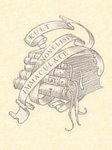I was reading about writing a book in a week on Broad Universe and something clicked. No, absolutely I'm not going to write a book in a week. I've got too many books I've written in a month that need my tender loving editing care to write yet another, especially since I'll probably do Nanowrimo again. But when I got to the part about heroines of straw I thought aha! That's something valuable to observe. The author focused on lack of preparation leading to her failures but I thought her mention of her characterization was a bigger clue to her underlying issues. Or not. She was writing about her process, not mine.
I wondered, can you prepare a character? Technically, I guess. You can decide their hair color and eye color, if they were molested as a child and how that makes them act out, if they drive a Cadillac or take the bus, and so on. You can even 'motivate' them. "My character wants, more than anything in the world, to travel to outer space." Is that going to be your climax, then? She finally gets to go to outer space? Or is that just the beginning? With the first choice, you've got a whole lot of empty to get her there. With the second, you've got the deadly 'now what?'
So I thought about characters and what happens when I've got a good one. And I realized that my favorite characters are strangers that I connect with and learn about as they grow in the story. They're people when, as our eyes meet for the first time, I get this tingle. I want to get to know them. Maybe it's a shallow impression. Man, is he hunky, and yet he's so shy! Or maybe it's that moment of we're all in deep doo doo and she looks like she knows what she's doing. I may be wrong, but my instincts say she's going to get me out of this mess alive where no one else can.
Hopefully you're getting that idea. I think this is yet another situation where 'write what you know' gets a lot of writers, including myself, into a little trouble. I can think of a novel in particular where I put so many of my own insecurities and philosophies and everything else into the character that she didn't have much going for her. Well, she had about as much going for her as I do. I can be pretty entertaining and I have a lot of friends, but for a character to carry a novel I think she needs to be surprising, uncomfortable, edgy--something (even if it's just one thing but hopefully several things) that's not me. I don't want her to be predictable and always react the same way I'd react if I were in the same situation.
I'm not saying characters have to be larger than life--not at all. But think about the first time you met your best friend, the love of your life, the teacher that changed your life, someone who impressed you even when you didn't know that much about them. I propose that a character needs to pop for you the same as real people pop out of society's swarm and instantly become individuals. Great actors can make even the most mundane secondary character interesting. You want to get to know them, even if they're bad guys (or maybe especially, if you think that way.)
The strongest short story I've recently written had this fun voice. I didn't know much about that character's history, but I immediately wanted to get to know her. She was a pistol. I think I'm going to try to write something like that again, about someone I'd want to really get to know. I think she's going to make a fabulous first impression on me. I'll combine it with the garden challenge, I think. Doesn't really matter, as long as I get to write about her. I can't wait!






1 comment:
I find that when I come up with a character that I want to write, I know that character quite well by then and am compelled to tell their story. Along that telling, I might meet a couple other characters who leap out and try to wrestle the story away, but I nearly always have at least one character I know going in, and that tends to be my point of view character.
But that character doesn't always end up being the main character. Phantoms was like that, where I had Gaston as my point of view character, but Perrine slowly took over and that changed the whole story.
I get into problems with stories when I think I know the character and then it turns out that I really didn't. Or that something major and drastic in their history has changed, which changes how I knew them (Jamesina is a prime example). Then I have my work cut out for me.
Post a Comment